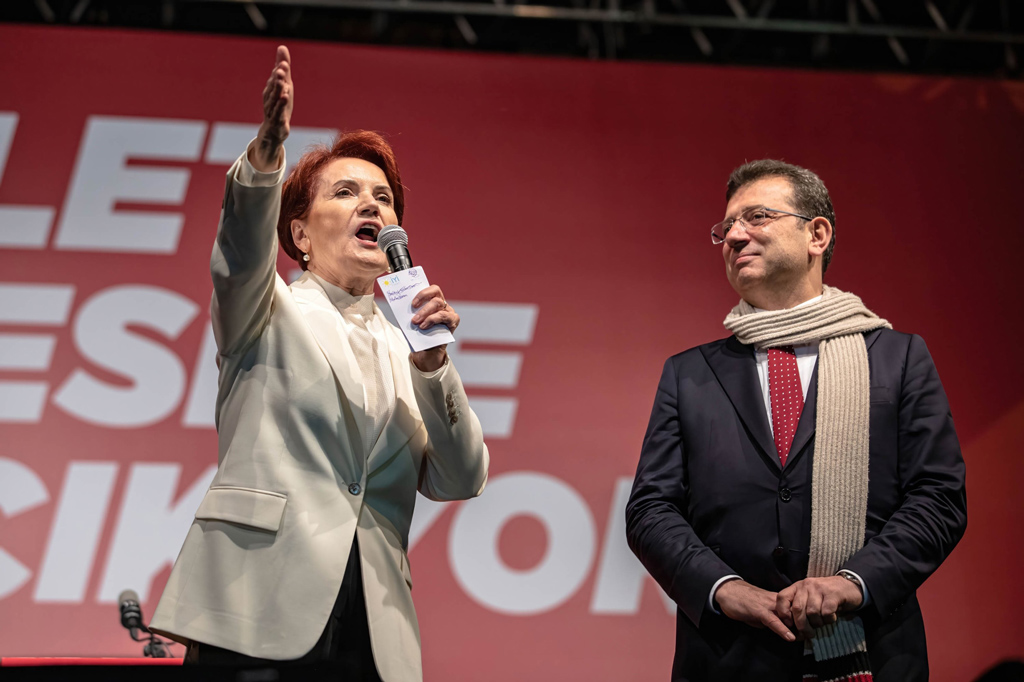Could CHP's struggle with change turn into lose-lose equation?
Ahead of last month’s elections in Türkiye, I argued that the tug of war between the opposition Republican People’s Party (CHP) and the Good Party (IP) over the joint endorsement of a presidential candidate had morphed into a lose-lose situation.
More


Sinan Oğan's move: What does it mean for Türkiye's second round?
Sinan Oğan, who contested the presidential election as the ATA Alliance’s candidate, endorsed President Recep Tayyip Erdoğan ahead of Sunday’s second round. Rejecting allegations of a “deal” between himself and the incumbent, he insisted that he acted in line with his “principles” and highlighted the importance of “stability” with reference to the People’s Alliance’s parliamentary majority.
More
Türkiye successfully held a historic election in line with democratic maturity. Governments around the world watched closely as 88.92% of eligible voters participated in the election and Turkish democracy proved its strength yet again. In the end, President Recep Tayyip Erdoğan beat his opponent, Kemal Kılıçdaroğlu, by almost 5 percentage points. Meanwhile, the People’s Alliance claimed 322 parliamentary seats – the majority – with 49.5%.
Tens of millions of Turks went to the polls and cast their votes last Sunday to choose the next president and the 600-seat Parliament. Over 30 political parties and five multiparty political coalitions (the People’s Alliance, the Nation Alliance, the ATA Alliance, the Labor and Freedom Alliance, and the Union of Socialist Forces Alliance) competed in the elections. At first, there were four official candidates, namely, President Recep Tayyip Erdoğan, Kemal Kılıçdaroğlu, Sinan Oğan and Muharrem Ince. However, after the withdrawal of Ince, only three of them competed for the Presidency.
With less than 20 days before the Turkish elections, the People’s Alliance and the Nation Alliance continue campaigning, believing they are set to win. At the same time, pollsters continue to release numbers supporting both sides’ claim of imminent victory, making the campaign more tense and ambitious.
Although the checks and balances mechanisms in modern liberal democracies have increasingly diversified, the most effective means for accountability and controlling leaders is still the ballot box. Of course, free, fair and competitive elections are not the only condition for a regime’s pluralistic and libertarian rule, but it is a prerequisite.
Ince and HDP: Factors to consider in first round of Turkish elections
With nearly 50 days left until the Turkish elections, the People’s Alliance and the Nation Alliance are doing everything possible to win the Presidency in the first round.
More


Akşener’s HDP dilemma: Both options lead to dead ends
Retracting from her comments due to the CHP’s attacks and isolating herself within the opposition bloc, IP Chair Akşener is likely to face pressure from secularists over the HDP’s involvement
More
The opposition leaders charge President Erdoğan with instituting ‘one-man rule’ but their solution is unimaginable. Nowhere in the world has political power been shared by eight parties
CHP Chair Kılıçdaroğlu will not be able to avoid being the target of the agenda, whether he is a candidate or not
The level of ambiguity seems to increase as that debate continues, mainly because the Turkish opposition bloc, known as the 'table for six,' is in a challenging and contradictory pursuit
The pro-PKK HDP strengthened its hand vis-à-vis the 'table for six' by opting to field its own presidential candidate
The main opposition leader Kılıçdaroğlu wants to use 'the system' and 'the table’s endorsement' to his current profile as 'the most obvious candidate'
The tug of war between the main opposition Republican People’s Party (CHP) and the Good Party continues over the selection of a presidential candidate. My sense is that the latter faces a “lose-lose” situation.
Distribution of parliamentary seats could encourage various players to work closer together, and the opposition fielding multiple candidates would actually benefit the People’s Alliance
CHP head Kılıçdaroğlu revealed the main opposition’s development plan. Ahead of that announcement, he raised expectations by claiming that he would 'unveil a vision to end the crisis forever'
'If the opposition were to win the 2023 elections, what will be the center of gravity in Turkish politics? Will the country’s political arena be organized around the CHP and the HDP or the CHP and the Good Party?'
'There is no politician in the opposition that could counterbalance that great advantage which Erdoğan enjoys'
In truth, the question at hand goes beyond that. This is about who would make crucial political decisions (and how) if the opposition bloc were to win next year’s elections.
The million-dollar question in Turkish politics is whether the opposition bloc – known as the 'table for six'– should stay together or disband.
The People’s Alliance, which already has a presidential candidate, will redouble its efforts to develop inspiring and constructive policies. By contrast, the competition among presidential hopefuls and over discourse and policy choices will mount pressure on the opposition bloc – the 'table for six.'

















